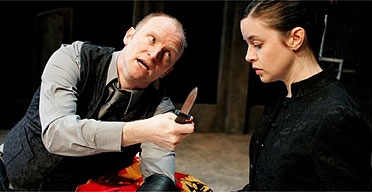
Productions of the Henry VI cycle are not so uncommon these days, and any new version must have its unique selling point. Northern Broadsides conceives the conflict as a harrowing parable of civil disturbance, resolved by a cathartic bout of clog-dancing.
As the clogs are wheeled into view - on special clog trolleys, or dollies, whatever clog conveyances are called - there is a sense of the company having come full circle. Fifteen years ago, founder Barrie Rutter chose Richard III to launch his assault on "velvet theatre" (which was his term for any venue where the audience didn't have to sit on benches). It's a measure of how far the company has come that it can now return to the work as part of a seven-hour cycle, albeit in partnership with the distinctly velvet environment of the West Yorkshire Playhouse.
Rutter's staging remains resolutely austere, however. The design aesthetic is restricted to scaffolding and sandbags, yet Northern Broadsides has always sought to make its major impact on the ear. It establishes a useful synergy between the blunt aggression of the verse speaking and the naked violence of the subject matter; though at the price of a certain homogeneity that leaves the first two plays feeling remorselessly unvariegated in pace and tone.
One begins to yearn for an inimitable, Northern Broadsides moment to lift things out of the ordinary. It doesn't really arrive until the conclusion of the second part when a jazz band strikes up and Richard Standing's Edward rips into a hot double bass solo to celebrate his coronation. At the same time, Conrad Nelson's crookback Richard hovers malevolently over the infant prince's pram, in the first recorded instance of an insincere politician kissing a baby.
Nelson's stealthy emergence as the diabolical Richard becomes the cycle's outstanding feature. Twisted of gait and warped of mind, he concludes the "winter of discontent speech" by falling downstairs, for which one audience member could be heard upbraiding him during the interval: "I'm a physiotherapist, and the golden rule is: always use the good leg first."
Yet Nelson (who also arranges the music and dancing) stands out precisely because he diverges from the blood-and-thunder mode of delivery, weighting the lines with carefully gauged introspection and a wickedly mercurial sense of humour. His final examination of his conscience on the eve of Bosworth becomes an astonishing portrayal of a mental breakdown precipitated by life-long self-loathing. Physiotherapists may quibble, but psychologists will have no complaint.
· Until April 22. Box office 0113-213 7700. Then touring.







